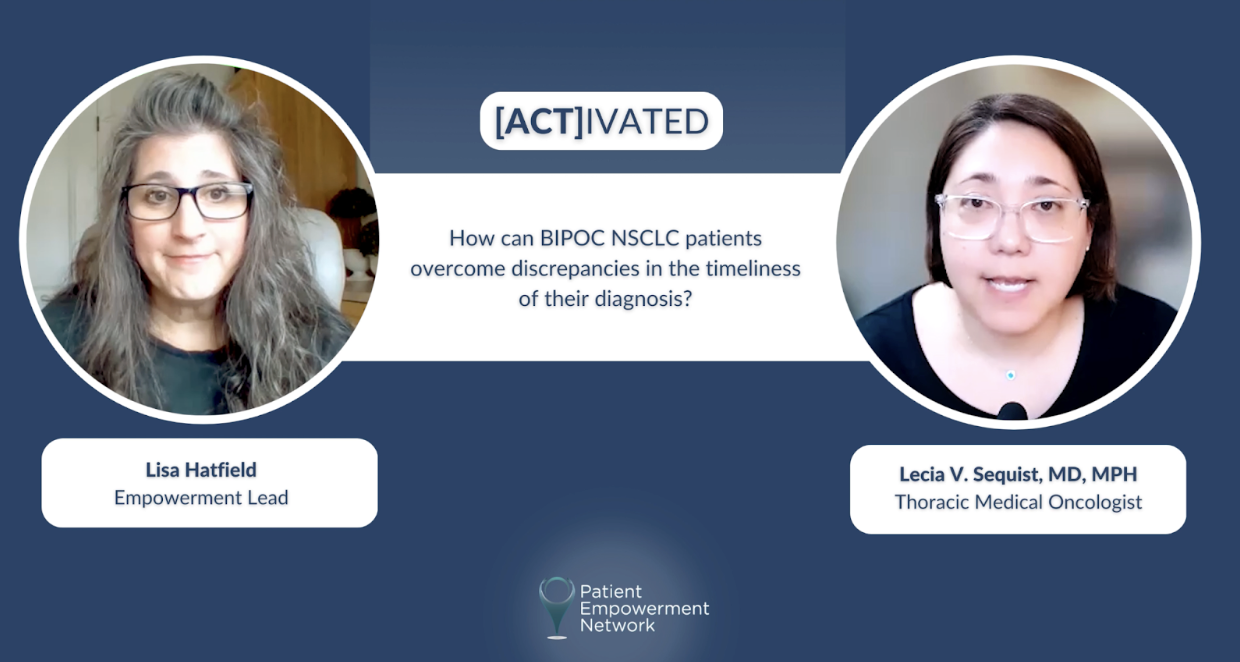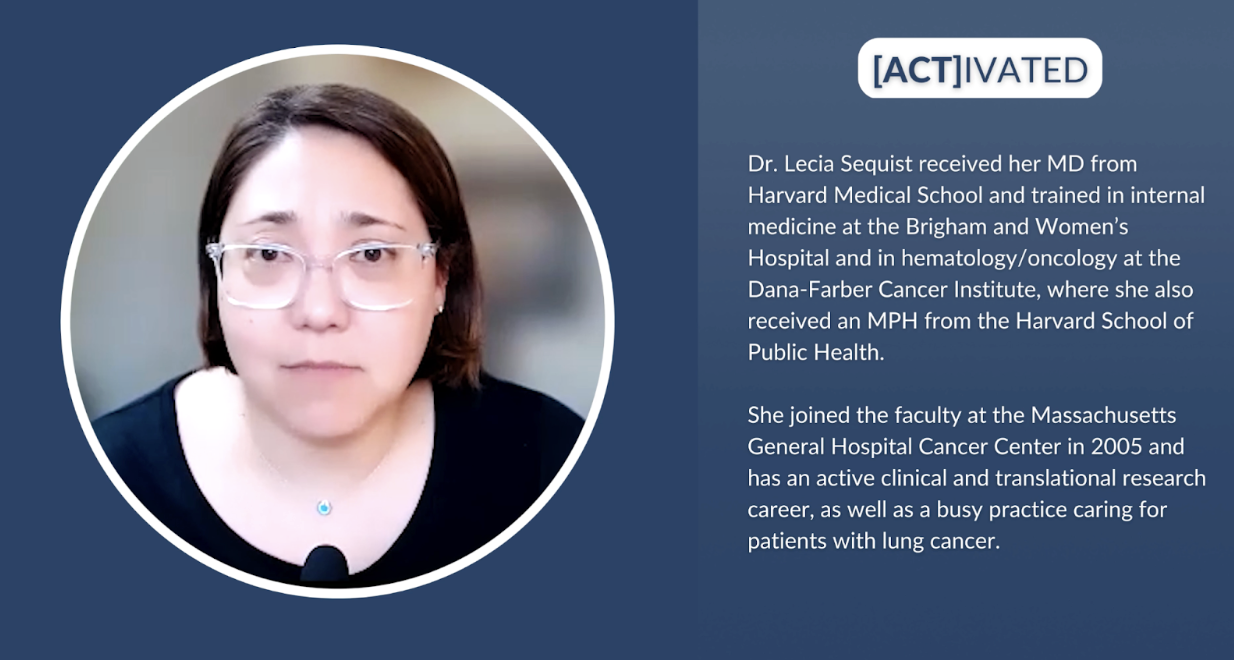Becoming an Empowered and [ACT]IVATED Lung Cancer Patient
Patient Empowerment Network (PEN) is committed to helping educate and empower patients and care partners in the lung cancer community. Lung cancer treatment options are ever-expanding with new testing and treatments, and it’s vital for patients and families to educate themselves with health literacy tools and resources on up-to-date information in lung cancer care. With this goal in mind, PEN initiated the [ACT]IVATED Non-Small Cell Lung Cancer program, which targets to inform, empower, and engage patients to stay abreast of the latest in lung cancer care.
The [ACT]IVATED Non-Small Cell Lung Cancer program is geared to newly diagnosed lung cancer patients, yet it is beneficial at any stage of disease. [ACT]IVATED helps patients and care partners stay abreast of the latest options for their lung cancer, provides patient activation tools to help overcome barriers to accessing care and powerful tips for self-advocacy, coping, and living well with cancer.

Lung Cancer Stigma and Disparities
Lung cancer is unique in comparison to other types of cancer. Overcoming the lung cancer stigma in the U.S. that was partially created by TV advertising campaigns to quit smoking. Cancer patient Lisa Hatfield spoke with Dr. Lecia Sequist from Massachusetts General Hospital. Dr. Sequist explained lung cancer stigma. “…it all comes together to make people think that those who get diagnosed with lung cancer did something wrong to deserve it, and that’s just not true. Nobody deserves to get cancer of any type. And lung cancer patients do suffer this unique blame that is not necessarily placed on other patients with other types of cancer, it’s really very unique to lung cancer. And it can be harmful for patients in many ways, it can be harmful in interpersonal interactions, but it also leads to policies and the whole way that our care system is set up that disadvantages lung cancer patients compared to other types of cancer patients.”
Though smoking can sometimes lead to lung cancer, this isn’t true for all lung cancer patients. Dr. Lecia Sequist shared some of the data about lung cancer risk and what’s still unknown about lung cancer risk. “…it’s true that cigarette smoking is one risk factor for lung cancer, but it’s not the only one. And we don’t fully understand what all the risk factors might be, but we know that there are people who have smoked a lot in their life and never get lung cancer. And on the flip side, we know that there’s people who have never smoked or who maybe quit 30, 40 years ago and will still get lung cancer. And how do we know who’s at risk?”
Access to lung cancer screening can also vary across the U.S. depending on what state you live in. Dr. Sequist shared about this key difference. “Lung cancer screening is really effective as far as finding cancer in the earliest stages. It’s not equally available across the country. Some of it has to do with there are certain states that expanded their Medicaid coverage as part of the medical care reform…and there are some states that didn’t expand the Medicaid, and then that situation translated into whether lung cancer screening was easy to get started in hospitals in that state. So there are some regions of the country, and a lot of them are in the South as well as the Western U.S., where if you want to get lung cancer screening, you may have to travel more than 30 miles or even more than 50 miles in order to get lung cancer screening.”
Dr. Sequist also shares how BIPOC lung cancer patients or other underrepresented patients can guard against care disparities. “You don’t have to ask permission to get a second opinion, you can just make an appointment with a different oncologist or go to an oncologist if you haven’t seen one before. Because lung cancer is changing and treatments are more successful, and we all have to do more as a community to make sure that those treatments are offered to everyone.”

Solutions for Better Lung Cancer Care
Patient education and empowerment are key pieces to receiving informed and optimal care. These efforts can take many forms but include approaches like improving clinical trial access, learning more from credible resources, asking questions to ensure your best care, and helping to educate others about lung cancer.
Dr. Lecia Sequist shared about the importance of learning about lung cancer information from credible resources. “A lot of people get lost in the terminology, the medical terminology. Don’t be afraid to ask questions or go to a website that is recommended, that’s been vetted by doctors to really have good quality information to help you understand what these terms mean. There’s also a lot of misinformation on the websites, that’s why you have to go to a site that maybe your doctor or your patient network recommends to make sure you’re getting accurate information.”
And lung cancer patients and patient advocates can help continue advancements in lung cancer screening and treatments. Dr. Lecia Sequist shared advice for how to take action on behalf of patients.
“Lung cancer can happen if you smoked, if you never smoked, anything in between. Anyone who has lungs can get lung cancer. And we have to take the stigma away from this disease. Nobody deserves to have lung cancer. It’s not something that people cause to happen to themselves, and they certainly shouldn’t be blamed if they are finding themselves in a position where they have lung cancer. So just spreading the word, lung cancer can happen to anyone, anyone with lungs can get lung cancer, I think can help start to change the perceptions.”
The use of artificial intelligence (AI) has led to improvements in lung cancer screening. Dr. Lecia Sequist explained how AI has advanced the detection of lung cancer. “The computer looks at a different type of pattern that human eyes and brains can’t really recognize and has learned the pattern, because we trained the computer with thousands and tens of thousands of scans where we knew this person went on to develop cancer and this one didn’t. And the computer learned the pattern of risk.”
Patient empowerment sometimes means that patients must advocate for their best care, and Dr. Sequist shared advice about testing. “…be sure to ask your doctor if genetic testing has been performed on your cancer, and if not, can it be performed? It’s not always the right answer, depends on the type of cancer that you have and the stage, but if you have adenocarcinoma and an advanced cancer, like stage III or stage IV, it is the standard to get genetic testing and that should be something that can be done.”
[ACT]IVATED Non-Small Cell Lung Cancer Program Resources
The [ACT]IVATED Non-Small Cell Lung Cancer program series takes a three-part approach to inform, empower, and engage both the overall lung cancer community and patient groups who experience health disparities. The series includes the following resources:
- [ACT]IVATED Expert Interviews
- [ACT]IVATED Resources
- [ACT]IVATED Patient Vignettes
- [ACT]IVATED Activity Guides
Though there are lung cancer disparities and disease stigma, patients and care partners can be proactive in gaining knowledge to help ensure optimal care. We hope you can benefit from these valuable resources to aid in your lung cancer care for yourself or for your loved one.
[ACT]IVATION Tip:
By texting EMPOWER to +1-833-213-6657, you can receive personalized support from PENs Empowerment Leads. Whether you’re a lung cancer patient, or caring for someone who is, PEN’s Empowerment Leads will be here for you at every step of your journey. Learn more.



